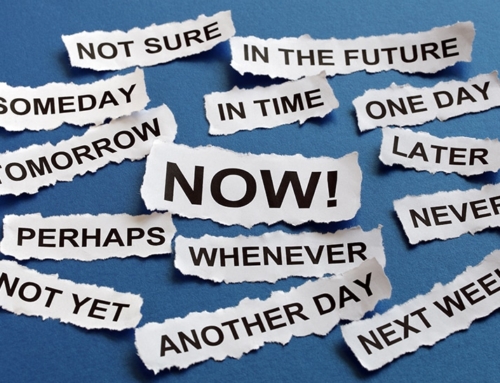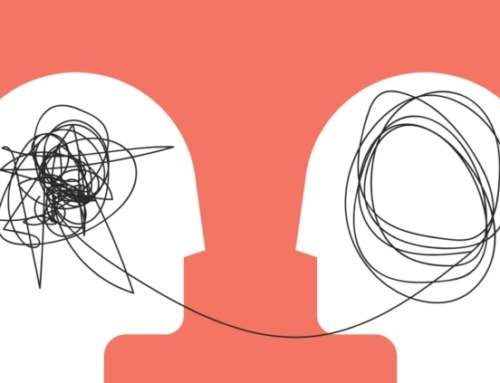This post is a follow-up to my January post on procrastination. So, without further delay, let’s begin.
My ongoing project of letting go of procrastination is going well…
As I typed the previous sentence, I paused to think, “How well?” My first thought was “About 50%,” but as I had that thought, it seemed off. My next thought was, “Well, maybe 33%”, and as I experienced myself thinking that, I thought, “Well, no. Maybe it’s only 25% … or maybe 10%.” Soon I gave up and realized I don’t know my degree of success or even how I should define it. It’s not because I initially overestimated my successes – more on that later – but rather because I underestimated the degree to which my life has been imbued with procrastination. I realized that much of my daily experience is mediated by thoughts about thoughts and thoughts about external events. These interpolated thoughts separate the response or resolution those initial thoughts or events warrant from those initial thoughts or events themselves. Thus, rather than take the needed action, I continue to circle thinking about it. The need for action often goes out of awareness but inevitably returns. And each time it does, I become aware of the tension that accompanies it. What I’ve become more aware of is that even when the object of procrastination is out of mind, its malign effects continue. A person who chronically procrastinates (or worries or ruminates), often feels tense, burdened, tired, put-upon, resentful, desiring of escape, and so forth. I did not, however, become fully aware of the distress and sense of burden I carry until I began to succeed in letting go of procrastination and, thus, had a different experience of living to compare it to. And, what really struck me is that I think I’m a productive and action-oriented person. I get a lot done. Despite this, I only now saw what a large role procrastination has played in my life and still plays.
Now, for an example of my success. Last Friday morning a business associate emailed me with a rather long email detailing five issues we needed to address. Just looking at the email made my heart sink. It seemed long and tedious. As I read it, it also seemed angry and accusatory. This was a perfect example of an event I would normally put off until Monday and then to lesser or greater degree, ruminate on it over the weekend. But because of my commitment to let go of procrastination, I considered my response for a minute and dashed off a response, “There a several issues it appears we have to talk about. When are you free to discuss? Is sometime today good?” He responded in the affirmative.
The phone meeting went well. It’s not that it was 50% or 90% less fraught than I feared. Rather it wasn’t fraught at all. Instead, it was pleasant and productive. It turns out my business associate wasn’t upset with me. He was fretting over issues that were of the sort that we were able to resolve immediately or to address soon with a clear plan in place. He was grateful that I responded with the alacrity that I did. But, of course, not all calls go well. Even if this call had turned out to be unpleasant, I would have still been glad to have gotten it over with and learned what I was facing in resolving the issues between us.
The more I experience these times of facing an event that demands action and respond by taking the needed action immediately, the more I see the experience as much more transformative than I imagined beforehand. This type of immediacy to life is freeing and thrilling.
And there is one more realization I had: to let go of procrastination (and worry or ruminations of whatever kind) requires trust, a trust that one can do what needs to be done now and a trust that when new thoughts and events arise in the future that require action, that one will be able to judge and act skillfully. Thus, action need not be delayed now, and future scary scenarios need not be ruminated upon. When needs arise, the response will be forthcoming. Of course, the foresight that leads to planning is good. However, most procrastination and ruminations do not lead to clear-eyed foresight and concrete, realistic plans but remain habitual ends in themselves, painful and dysfunctional though they are.
What I wrote here about immediacy of action differs from mindfulness, but the two are related. A mindful attitude of experiencing thoughts as thoughts and emotions provides the requisite distance from them to act more immediately. And, conversely, acting more immediately provides repeated experiences of success at setting aside such intervening thoughts and emotions and not giving them the power to derail action. Thus, letting go of procrastination becomes a form of mindful practice.
Please share your insights on how you overcame procrastination or teach others to do so. I would like to include them – with your permission – in a follow-up post on this topic.
Thanks and take care.
Dr. Jack
Language Brief
“We know only too well that what we are doing is nothing more than a drop in the ocean. But if the drop were not there, the ocean would be missing something.” ― Mother Teresa
“People pay for what they do, and still more for what they have allowed themselves to become. And they pay for it very simply; by the lives they lead.” ― James Baldwin
“When the actions become more frequent than the words, success becomes heavier than the dreams. Do more, say less.” ― Israelmore Ayivor
“We are more severe judges of our own acts… We judge our thoughts, our intents, our secret curses, our secret hates, not only our acts.” ― Anaïs Nin







Leave A Comment